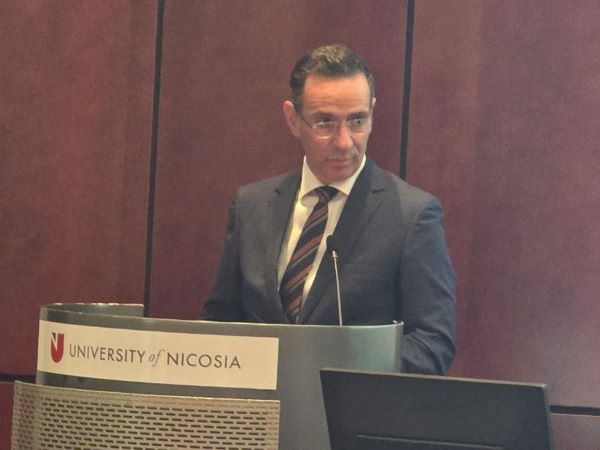Press Releases

31-05-2024 12:57
Opening address by the Deputy Minister of Research, Innovation and Digital Policy, Dr Nicodemos Damianou, at the Conference: New Technologies in the World of Communication
It was estimated that 20 minutes in the Metaverse – imagine yourself wearing your VR headset navigating a virtual world as your avatar – generates two million data points. And assume that you purchased a ticket in the form of an NFT using your crypto wallet from your favourite crypto/NFT marketplace, and you are in the Metaverse, watching the virtual concert of Ariana Grande. Who is the data controller in that case – and hence the entity responsible for compliance with privacy laws? The Metaverse platform? The Crypto wallet provider? The NFT marketplace or Ariana Grande? By the way, Ariana Grande did hold the third most popular virtual concert on the Metaverse (on the Fortnite platform, in particular), attended by more than 27 million unique viewers. If you put AI-based avatars in the equation, things become too complicated.
So, thank you all for being here and thank you for inviting me to join this distinguished gathering of professionals, academics and renowned experts. It is always exciting to talk about New Technologies and in particular, Artificial Intelligence (AI). This conference is testament to the fact that technology is indeed part of our lives now more than any other point in time, and we thus need to address its implications across all dimensions, including the legal and regulatory implications.
I think we can all agree that in recent years, the landscape of communication has undergone a dramatic transformation. The internet has been a game-changer, creating a global digital community, while instant messaging apps have made communication instantaneous and borderless. Platforms like Facebook, Twitter (X), Instagram, TikTok and LinkedIn have redefined social interaction, while also becoming a powerful tool for businesses but also governments.
The advent of new, ground-breaking technologies, such as AI, augmented and virtual reality, Internet of Things and blockchain, has revolutionised the way we interact, expanding the horizons of what is possible in both personal and business settings, altering existing norms and practices, and even changing the very structure of our society. We are now all immersed in a digital world where information and news travel instantaneously. And that is Web 2.0 – Web 3.0 (the Metaverse for many people – a five trillion-dollar market by 2030 according to analysts); it is coming and it is going to be an even more immersive way of navigating the internet and interacting with each other.
In this ever-evolving and data-rich landscape, we need to act swiftly to adapt and develop the capabilities required to fully capitalise on the potential ahead, while addressing the legal and regulatory implications, amongst other things.
Ιn particular, with regards to AI and machine learning, I think it is now an acknowledged fact that this technology is poised to reinvent the entire world of technology solutions, including the world of communications. The rise of Generative AI has enabled tailored, quality content creation and curation, at scale. ChatGPT has become one of the fastest-growing platforms ever – literally over the course of a few months – enabling the automation of communication across a global context. AI algorithms can analyse vast amounts of data in very short periods of time to uncover patterns and insights that were otherwise not impossible, enabling us to reach more informed decisions, leading to a myriad of solutions that keep growing in sophistication and leading us closer to what technologists call Artificial General Intelligence (AGI), which could potentially lead us to a state where AI surpasses human capabilities across a wide range of cognitive tasks.
According to a number of surveys, approximately 40% percent of businesses have already integrated AI into their operations, while another 38% is considering doing so. McKinsey research indicates that Gen AI applications stand to add up to $4.4 trillion to the global economy annually, noting that within the next three years, anything in the technology, media, and telecommunications space not connected to AI will be considered obsolete or ineffective. In Cyprus, the adoption of AI by our businesses – most of which are of course SME companies – is still below the European average.
Lack of trust, however, remains a major barrier to large-scale Generative AI adoption and deployment. The increased use of AI models has led to growing concerns and rising public anxiety on practical, ethical and legal considerations, inherent risks and potential damaging effects. Governments, businesses and the public are all prone to such vulnerabilities.
Primary Gen AI concerns evolve around how models and systems are being developed and how they are being used. They are focused on the lack of transparency in the functioning of Gen AI systems, the origin of the data used to train the AI models and issues of human bias, hallucination effects, data privacy breaches and potential intellectual property infringements.
Gen AI could be used to generate and disseminate malicious content, such as disinformation, deepfakes, and hate speech. As more than two billion people in 50 countries head to the polls this year, there are increasing fears of such content being used to spread misinformation and propaganda, confusing voters and leading to political tensions, even violence.
AI enabled tools can also be used to carry out sophisticated cyberattacks, even though cyber-defense organisations are also increasingly relying on this technology to help flag suspicious data, detect and prevent attacks. In fact, and according to the Economist, the future of cybersecurity is fighting AI with AI.
The full range of risks arising from AI use is unknown. What is certain is AI’s wide impact on our future, across the entire spectrum of industries and social activities.
So, the question is: How do we seize the full potential of AI – and other new emerging/cutting-edge technologies – while ensuring that they are used effectively and responsibly to benefit our community, our economies, our well-being? The digital age offers the promise of a truly democratic culture of participation and interactivity. Realising that promise and striking the right balance between maintaining digital trust and fostering technological innovation is the challenge of our era.
To this end, the European Union (EU) has recently introduced the AI Act, the first ever comprehensive legal framework on AI worldwide, aimed at fostering trustworthy, human-centric AI solutions. Following a risk-based approach, the legislation sets clear requirements and obligations regarding AI development, deployment and use, so as to ensure AI systems respect fundamental rights, safety and ethical principles.
Simply put, the AI Act aspires to assure Europeans that they can trust what AI has to offer. I was in Brussels last week, attending the EU Telecoms and Digital Council, and this was a big part of the debate: from Rulebook to Practice – how do we put all of the legislation around digital technologies into practice?
Cyprus, through the Deputy Ministry of Research, Innovation and Digital Policy, is taking all necessary steps to ensure timely national implementation and compliance. This includes the designation of a national Competent Authority within 12 months after the regulation’s entry into force – which is expected in early June – as well as the creation of a regulatory sandbox where companies can test AI systems in a controlled environment. Bans are to take effect after just six months and requirements for general purpose AI (GPAI) after 12 months, while high-risk AI systems will have 36 months to comply with the relevant requirements and obligations.
At the same time, we are currently redrafting our national AI strategy, following an applied approach; integrating AI in public administration or sectors of the economy through specific use-cases, as well as adopting AI in the private sector. As a first application of AI in the Government, we will be introducing the Digital AI Assistant as part of our Digital Citizen initiative, the first iteration of which will be available on the new government portal (gov.cy) by the end of 2024.
The technologies we are developing today do not only transform how we interact with each other but also shape the world of tomorrow. As we continue to innovate and explore these new frontiers, let us strive to create a world where technology is the means to creating value for society at large. We cannot and, in my view, should not stop the possibilities made available through technologies such as AI. We can and we should evolve around this progress, while responsibly addressing all legal, regulatory and ethical issues that arise as part of this evolution.
Thank you.
(GS/EP)
Relevant Press Releases


10-07-2024 18:42
Cyprus is a ‘Strong Innovator’ for the third consecutive year





